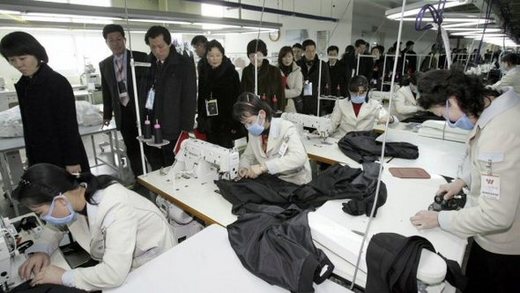 |
|
North Korean workers do their jobs at a firm located in the Gaeseong industrial complex while would-be investors from South Korea take a look around. Yonhap
|
Restructuring of pay distribution at Kaesong possible
North-South cooperative projects cannot be maintained as if nothing has happened, said Alexander Vershbow, U.S. ambassador to South Korea, at a forum held at the Korea Press Center in downtown Seoul on October 18. Ambassador Vershbow’s comments can be seen as an addendum to comments made the same day by U.S. Assistant Secretary of State Christopher Hill, which reporters have interpreted as a "yes" to the Gaeseong (Kaesong) industrial park and a "no" to Mt. Geumgang (Kumkang) tours. Assistant Secretary Hill said that the Mt. Geumgang project "seems to be designed to give money to the North Korean authorities," while saying that the joint Gaesong industrial park project seems instead aimed at tackling the issue of long-term economic reform. Hill then said, "The South Korean government is looking at all the North-South projects, and I’m sure they are going to evaluate them all in terms of what’s in the interest of South Korea and what would be an appropriate response," indicating that the ultimate discretion over such projects would lie with the South. The overall remarks of Vershbow or Hill, however, sound as if they demand Seoul to make swift moves to cut off one or both of the two major inter-Korean projects. The logic behind the U.S. stance is that as North Korea did something wrong, it should be punished. To isolate and blockade North Korea is central to this punishment. The U.S. thinks that only by cutting off North Korea’s lifeline will the communist nation make changes. In this respect, the U.S. wants the severance of South-North relations, including the Gaeseong project. The gulf between the Roh and Bush administrations has thus grown even wider.However, even if the Roh administration does not fully follow the U.S. strategies of blockade and isolation, it cannot ignore the spirit of the U.N. Security Council Resolution 1718, which it signed. Seoul has already pledged to support and conduct itself under the tenets of the resolution. According to the resolution, the government needs to put a halt to cooperative projects which help North Korea produce weapons of mass destruction (WMD). South Korea cannot take issue with all cash flowing to North Korea, but it is necessary to review the wage payment system for North Korean workers at the Gaeseong industrial park, according to the opinion of both the government and experts. Issue has been raised with the current payment method, as the money goes to the North Korean administrative agency of the special district, rather than directly to the workers. Prof. Yang Mu-jin of Kyungnam University said, "It is necessary to establish that the principles of market economy should be the ones at work, and a system of direct payment should begin, for the survival of the Gaeseong project, as well as at the humanitarian level." He predicted that North Korea would not close the Gaeseong industrial district if the wage distribution method were changed. When Song Min-soon, top security aide to President Roh, said that "the government will review parts [of the inter-Korean projects] to modify and adjust," he seems to have been talking about such proposals. Regarding the overall U.S. stance on inter-Korean cooperation, Prof. Yang Mun-su of the University of North Korean Studies said, "If we take issue with cash payments [to North Korea], all inter-Korean economic exchanges will become targets and it will be tantamount to an embargo on exports." Prof. Yang said, "Washington paid US$23.5 million to the North Korean regime for excavating the remains of its soldiers from the Korean War. Then, can we say that the U.S. also supported the reclusive nation’s development of nuclear weapons?"






